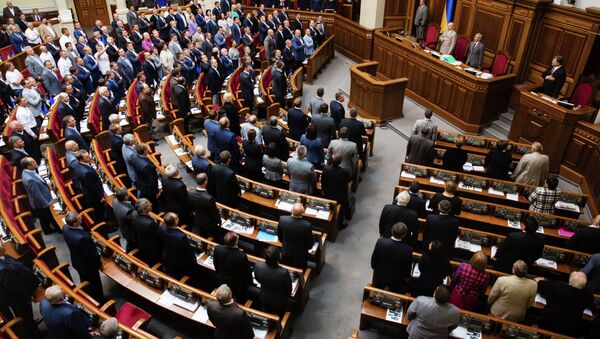MOSCOW, October 27 (RIA Novosti), Daria Chernyshova — Ukraine is likely to see a three-party coalition that will have to tackle the country’s dire economic situation that will likely temper the anti-Russian rhetoric of Prime Minister Arseniy Yatsenyuk, whose People’s Front party leads in the elections, political scientists told RIA Novosti on Monday.
“The most likely outcome is the three-party coalition, the third party is Samopomich, Self-Help, which also did very well,” Andrew Wilson, a senior policy fellow at the European Council on Foreign Relations told RIA Novosti. “That three-party coalition should have a majority.”
On Sunday, Ukraine held early parliamentary elections. With some 55 percent of ballots counted, the People’s Front has garnered 21.6 percent of the popular vote, and the country’s current president’s Petro Poroshenko’s Bloc is close behind with 21.45 percent, according to the Central Election Commission. Poroshenko already announced that he will begin forming the parliamentary majority coalition starting Monday. The two leading parties are followed by the Samopomich, headed by Lviv Mayor Andriy Sadovy, with 10.81 percent of the votes.
“While Yatseniuk’s relatively strong performance could strengthen the hand of Ukraine’s anti-Russia demagogues – his People’s Front is seen as firmly belonging to the pro-war camp. Yatseniuk’s rhetoric and policies would likely soon be tempered by Ukraine’s dire economic predicament,” Vlad Sobell, a professor at New York University’s Prague campus told RIA Novosti.
“The main losers are Oleg Lyashko’s Radical Party [8 percent] and Yulia Tymoshenko’s Batkivshchina [6 percent]; indeed, it seems that Tymoshenko’s career as politician is now over,” Sobell said.
However, Wilson believes that it is too early to say that, as “it could have been worse, she could have missed parliament altogether.”
Economic matters appear to be at the forefront of the new government’s tasks, as the country finds itself in a dire economic situation.
“Ukraine badly needs a pragmatic and, above all, effective government because the country stands on the brink of an economic catastrophe; social hardship is only just beginning to be felt as winter approaches. The new government will need to negotiate skilfully with Moscow, Brussels, Washington and the IMF to demonstrate that it can deliver on what is agreed,” Sobell told RIA Novosti.
Wilson stressed that the new “government needs to show that it is putting the right measures in place.” And that includes fighting against corruption and promoting measures that will promise economic improvements. “People need to see promise of the future, otherwise the government will be pretty unpopular pretty quickly,” he said.
“Samopomich has put forward as his key demand the local elections that should be held next spring – that would require constitutional change. So the big issue is whether the government comes straight on big issues like constitutional change or on the bread and butter stuff, cause the economy is in serious trouble,” Wilson added.
Sobell noted that Poroshenko is most likely to push for yet another revision of the constitution, “reverting to stronger presidential powers, improving the effectiveness of the Rada [Ukraine’s parliament] and devolving powers to the regions.”
“The last of those moves will be key to securing a rapprochement between Kiev and the separatist regions and could eventually help establish a lasting political settlement. Reforms leading to more effective government should, of course, be welcomed by all sides – the Ukrainian people, Russia, the EU and the US,” Sobell noted, adding that the improvements on this front are desperately needed in order to “overcome the political paralysis in Ukraine of last two decades.”
As for Moscow, Sobell underlined that “Russia wants a stable and prosperous Ukraine that will serve as a bridge between the Eurasian Union and the EU,” he said. “Instead of bloody civil war, Ukraine needs, above all, robust financial aid and economic restructuring – with Russia an integral part of the equation.”



